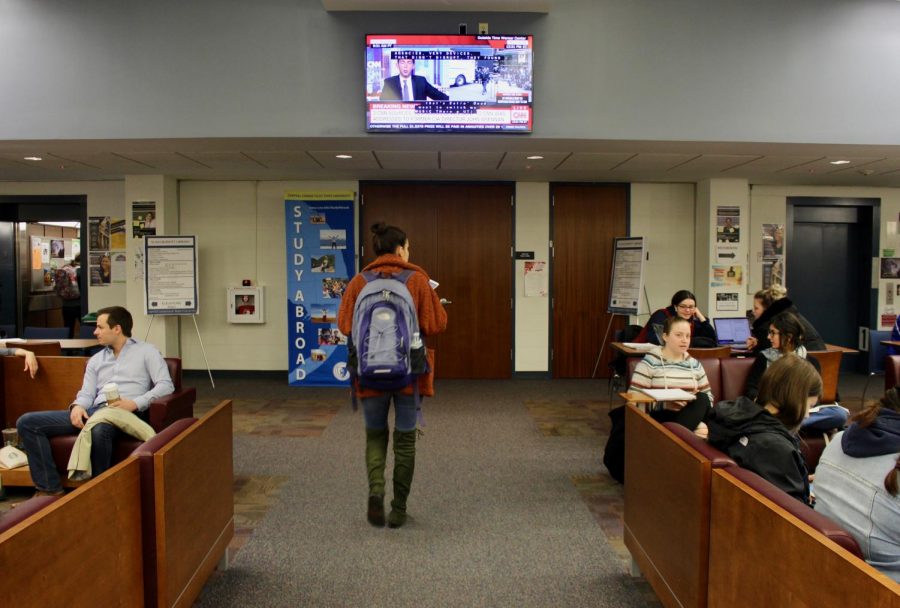‘I’m Depressed, But I’m Informed’
For some, news brings not only information, but harm to mental health.
November 8, 2018
This article was first published on Central Connecticut’s Focus Mental Health site, FMHnews.com, and is being republished in The Recorder with FMH’s permission.
The news plays every day on the large plasma screen that hangs over the Elihu Burritt Library’s elevators. Working behind the circulation desk, Shane Holley ignores it mostly as it runs silently in the background, subtitles making up for the lack of sound.
But sometimes when he gives the screen a glance, the accounting senior’s emotions don’t like what he sees.
“[News makes me] a little bit depressed because more often than not, it’s reporting on, ‘This thing happened and all these people died’ or, ‘There’s this new policy that’s going to cause all of these problems.’ It’s like, I didn’t need to know that,” Holley said.
News on tragedies, Holley explained, could definitely spoil his mood for the remainder of the day. But Holley has slowly grown apathetic to the news coming out of the Trump Administration. News like the recent confirmation of Supreme Court Justice Brett Kavanaugh brought with it frustration and confusion, and Holley reluctantly swallowed the news down before moving on.
“Regardless of whether or not Kavanaugh did it, the fact that there are implications that this may have happened and he’s being [placed] on the Supreme Court,” Holley started, letting out a nervous laugh. “That shouldn’t have happened.”
“I’m depressed,” Holley went on, “but I’m informed.”
This trade-off—mental well-being in exchange for information—isn’t uncommon. Imaris Loja, a computer science sophomore, watched Kavanaugh’s confirmation as well, and his appointment to the Supreme Court in the news brought anger, sadness, disappointment and numbness.
“I feel a little powerless like all I can do is vote,” Loja said, adding that though she chooses to keep up-to-date with the news, she doesn’t actively seek out articles unless absolutely necessary around election time.
Loja also said she is tired of reading repetitive themes about women’s oppression and is tired of the usual feelings that come with such news.
“My whole day won’t be ruined [from the news], but I’d prefer not to read the same thing over and over again,” Loja stated. For her, prior to President Donald Trump taking office, the news hadn’t affected her this way.
“This country was something that was supposed to be built on good morals, but that’s just not the case.”
A 2017 survey by the American Psychological Association found that adults felt “conflicted between their desire to stay informed about the news and their view of the media as a source of stress.” In the survey, 56 percent of adults said following the news caused them stress.
Furthermore, constant exposure to negative news has multiple mental side-effects. For one, inundation of particularly traumatizing news can lead to ‘disaster fatigue,’ or an apathy toward crisis, according to the Center for Disaster Philanthropy. It is why many have become accustomed to, for example, mass shootings; repeated exposure to traumatic stress restructures the brain to provide emotional and cognitive distance when faced with such tragedies, an article in the U.S. National Library of Medicine by Dr. J. Douglas Bremner of the Emory Clinical Neuroscience Research Unit at Emory University found.
Additionally, the collective anxiety that has come with Trump’s election was unofficially named the “Trump Anxiety Disorder” in a 2017 essay for the book “The Dangerous Case of Donald Trump.” Clinical psychologist Jennifer Panning donned the anxiety with the title because “symptoms were specific to the election of Trump and the resultant unpredictable sociopolitical climate,” she wrote.
Going further, the term “headline stress disorder” was coined by therapist Dr. Steven Sosny, who wrote that “continual alerts from news sources, blogs, social media and alternative facts feel like missile explosions in a siege without end [to some people],” in an article for The Washington Post.
“When there’s a lot of real threats to one’s safety or security, be it implicit or explicit, that’s going to disrupt one’s feeling of health and well-being,” Dr. Timothy Scott, a CCSU clinical social work professor, said. People, he elaborated, absorb negative news as personal attacks, hence the negative blow to their mental health. “That plays out when it comes to racism, misogyny, who belongs and who doesn’t and who deserves to be marginalized.”
News on the current political climate, Scott said, intensifies these perceived threats, and the Trump Administration is not the cause; it “represents a resurgence of these preexisting inequalities.”
“There’s a lot of stuff that’s outrageous. I have my own political views, and yes, there’s a constant feeling of outrage. When you see the lives that are being impacted and that people are being hurt and suffering unnecessarily because of certain ideological positions that are inherently violent, that’s really upsetting to me,” Scott stated.
“[This outrage is] certainly not healthy,” Scott continued. “It’s important for a lot of us, including myself, to have people that we can talk to about it so we can find that sense of community in sharing our outrage.”
Scott cited the protests springing up around the country as emblematic of individuals wanting to exert some control while feeling disempowered, for they have “significant therapeutic value.”
In addition, news on the current political climate shapes the way people think, which in turn contributes to anxiety, depression and stress. CCSU Media Psychology Professor Bradley Waite attributes this to the convenience of multimedia platforms in receiving news. He recalled the downing of the World Trade Center and how his students, faculty and others “appeared to have post-traumatic stress-type reactions from watching so much news coverage of that terrorist attack.”
“In part, we see the world through our media use. Most of us get news feeds through our media and social media these days,” Waite said. “We live in an all or mostly blue or all or mostly red media world, with little exposure to alternate ideas.”
Politicians, particularly those whose decisive rhetoric and controversial policies make it into the news, could also be perceived at fault. Republican then-candidate for Connecticut’s Fifth Congressional District Manny Santos believes so, saying that while he’s unsure of whether the news cycle affects people’s minds, ‘personal’ politics certainly do.
“The one thing that’s bothersome is that people make [public policy] personal. That’s what every elected official should be concentrated on, public policy. Not personal attacks. When people start making politics personal, they start getting impacted seriously,” Santos stated.
To Santos’ then-opponent Democrat Jahana Hayes, the divisiveness that filters into the news from politics is to blame, as politicians “pick and choose” who they represent rather than all of their constituents, in her opinion.
“People are depressed, anxious and afraid, and a lot of that has to do with this [political] climate,” Hayes said. “People are worried about their families and their futures, and that definitely affects their health.”
“We have to take some responsibility for that,” Hayes continued. “We elect officials to work on behalf of the people, not to have these hard party lines and ultimately the people of our community are suffering.”








